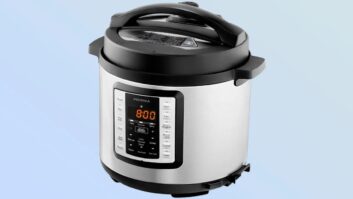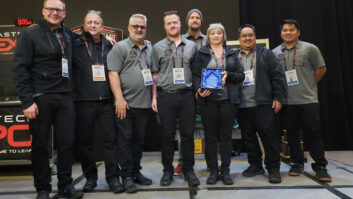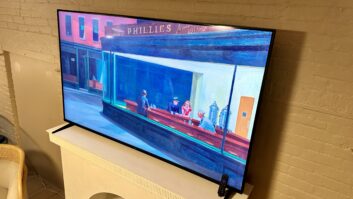Minneapolis — Best Buy is a four-time winner of TWICE’s Excellence in Retailing Awards, and with good reason.
With few exceptions (most notably its failed $685 million buyout of Musicland five years ago), the company has
made all the right moves to position itself as a global force in consumer electronics.
Indeed, the company now maintains operations in China, Europe and Canada, and is preparing for its first stores in Turkey and Mexico. Recent news reports out of Russia suggest plans for a Best Buy presence there as well.
The international expansion comes amid market saturation and slowing demand in the United States, and is one of five growth drivers that the company said will help double its sales to $80 billion over the next five years. As president/COO Brian Dunn recently told shareholders at Best Buy’s annual meeting, the goal is ambitious but not unprecedented, as the retailer had previously doubled its top line to $40 billion between 2002 and 2007.
The other four growth strategies, as outlined by customer operating group VP Mike Vitelli during a recent investor conference, include simply rising with the CE industry’s steady tide of 6 percent annual gains, and the development of completely new business models. These include the planned national rollout of Pacific Sales, the company’s West Coast chain of premium appliance stores, and last month’s announced acquisition of Napster, the music-download and -streaming site, for $121 million.
“We can foresee Napster acting as a platform for accelerating our growth in the emerging industry of digital entertainment, beyond music subscriptions,” said Dave Morrish, Best Buy’s connected digital solutions executive VP. The chain will use the purchase to “leverage our existing relationships with the labels, the studios, and the hardware providers,” he added, calling Napster and its 700,000 subscribers “an outstanding addition to our already robust portfolio of partners and offerings in the digital music space.”
Other growth plans cited by Vitelli include increasing market share by opening new stores (topping out at about 1,400 locations, compared to the current 975), and by developing categories where share is presently limited.
These latter areas include:
• Apple computers, a relatively recent addition, which are receiving their own dedicated space in stores;
• major appliances, which are benefiting from a differentiated assortment and dedicated sales force; and
• mobile phones, which have been reinvigorated by the new Best Buy Mobile business model, developed with Britain’s Carphone Warehouse.
Best Buy Mobile “dramatically improves the customer experience for wireless products,” the retailer said, driving a “strong” double-digit increase in subscriptions and a nearly triple-digit gain in same-store sales of mobile phones and accessories during the fiscal second quarter, when the nationwide rollout of the in-store cellphone shops was completed.
What’s more, the retailer’s newly acquired 50 percent interest in the retail and distribution business of Carphone Warehouse has paved the way for Best Buy’s entry into Europe. The new venture, called Best Buy Europe, covers 2,400 stores in nine European countries and holds the key to the continent for the company.
The third element of Best Buy’s growth strategy is the introduction of new categories, including musical instruments. The chain has set its sights set on becoming a dominant player in the $8 billion musical instrument market, and will embark on that goal by opening 75 to 85 in-store musical instrument shops by year’s end, while selling an expanded selection of instruments online. The stores-within-a-store average about 2,500 square feet and stock more than 1,000 SKUs, including premium brands.
Steve Hehir, musical instruments senior VP, called the strategy “a natural progression for Best Buy. Consumers have always looked to us as a resource for music in a variety of formats.”
At the same time, the company is expanding its already sizeable private-label product portfolio. The latest additions, sold under the Insignia brand, include the first in-house GPS devices plus two new HD Radio-equipped products. The GPS units are high-end portable navigation devices (PNDs) that are among the industry’s first to include built-in cellular modems and a local Google search, while the HD products include a CD/DVD and iPod dock micro system and a component-style HD Radio tuner.
Another house brand getting lots of mileage is Geek Squad. Best Buy has successfully leveraged its PC repair acquisition into a full-spectrum service and installation business that features its own private-label products and freestanding stores. Most recently, the brand has also become the overarching nameplate for all Best Buy extended service programs.
Vitelli said the company is also working hard to engender more personalized service on the store level in order to combine the scale benefits of a national chain with the hands-on attention of an independent dealer. The latest example of that is a new customer-centric store that opened earlier this month in the Denver suburb of Aurora. Best Buy said it worked with the local community and paid close attention to key insights from women in designing it.
The store’s look reflects the “Colorado lifestyle” and the sentiment of local residents, the company said, who assisted Best Buy in choosing the store furnishings. Design elements include softer lighting, lifestyle imagery and more neutral tones in display areas, and Best Buy will also offer educational classes pertaining to the specific interests of the Denver community.
Input from women, including Best Buy’s own employee-based Women’s Leadership Forum, or WoLF pack, which promotes women’s interests in Best Buy stores, resulted in skylights, carpeted floors, wood paneling, room vignettes, toddler-height sinks in restrooms, and a private room with a rocking chair and free diapers for new moms. The store also offers such specialty services as gift wrapping during the holidays, assistance with opening packages and in-store recycling services.
Other elements that were designed to enhance the store’s “inviting ambiance” include engaging, consumer-friendly signs that encourage consumers to demo the products, and an in-store video message from a BlueShirt sales associate, Best Buy said.
At the same time, and at the opposite end of the service spectrum, Best Buy is experimenting with vending machines, beginning with a test in 12 U.S. airports over the summer. The automated kiosks are branded Best Buy Express and carry cellphone and computer accessories, digital cameras and accessories, flash drives and portable storage devices, MP3 players, headphones, speakers, unlocked phones, portable gaming devices, gift cards, travel adapters and chargers.
“The launch of Best Buy Express is another way for Best Buy to provide consumers with the products they need from a brand they trust, even while they’re on the go,” said Chris Stidman, the retailer’s strategic planning VP.
“We believe our strategic indicators remain strong,” Brad Anderson, vice chairman and CEO, said in a statement last month that accompanied Best Buy’s second-quarter results. “Customers are noticing and appreciating the changes we’ve made in our shopping experience.”
Those indicators included a 32-percent increase in the company’s online business, a gain of 1.6 percentage points in market share, a 27 percent hike in Best Buy Reward Zone loyalty program membership to 31 million customers, a 19 percentage point decrease in employee turnover to 49 percent, and customer satisfaction scores that reached an all-time high during the most recent fiscal quarter.
Added president Dunn in a statement to TWICE: “While we are very proud of Best Buy’s 40-year track record of growth, we are even more excited about the possibilities the future holds. We are on a mission to become an $80 billion enterprise through a focus on world-class employee and customer experiences, which ultimately deliver the strong returns our shareholders have come to expect from Best Buy.”
mobile phones, which have been reinvigorated by the new Best Buy Mobile business model, developed with Britain’s Carphone Warehouse.major appliances, which are benefiting from a differentiated assortment and dedicated sales force; and Apple computers, a relatively recent addition, which are receiving their own dedicated space in stores;












